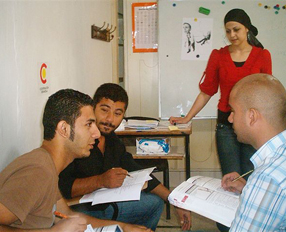The purpose of this Agreement was to improve the quality of primary, secondary and adult education in Palestinian Territories, Lebanon, Jordan, Syria and Egypt. It was aimed to improve academic performance levels in primary and secondary schools and foster the integration of young people and adults into working life. Due to the violent situation that prevailed in the region, actions that promoted peace and the values of co-existence had also been planned.
The Agreement’s courses of actions were classified into the following categories:
- Institutional strengthening of existing school networks and creating new educational resources. Improving facilities and infrastructures, incorporating new equipment, facilities and services, and new school curricula.
- Improving employment opportunities for young people and adults. The conflict in Lebanon had given rise to new vocational training needs linked to reconstruction-related activities (construction, plumbing, electricity, etc). Other actions were specifically designed to help women find employment.
- Improving teachers’ pedagogic and management skills. This aspect was an important part of the objective of improving the quality of education. The planned actions included seminars and training courses aimed at improving communication and relations between teachers and students, and retraining teachers in the management of existing pedagogic resources.
- Improving the academic performance of students through study techniques, time and information organization, note-taking and searching for information.
- Improving the all-round education of students through extracurricular activities that strengthened personal relationships and keep young people away from street violence, some of which were specifically designed to promote democratic values, social participation, co-existence and tolerance. The aim of all these activities was to promote dialogue and co-existence among young people from different communities and religious faiths.
The Agreement was clearly compatible with local policies in which education was a priority objective. All the participant countries were associated with the UNESCO-promoted initiative Education for All, whose commitments have also been undertaken by the Spanish Agency for International Cooperation. Furthermore, the Arab States at the Regional Conference in Cairo adopted the Arab Framework for Action to Ensure Basic Learning Needs in the Arab States in the Years 2000-2010, a reference guide for extending education to all.





